The Scariest Lie at the GOP Debate Wasn’t About Donald Trump
The debate confirmed two things: that climate denial is thriving in the GOP, and that these candidates will do absolutely nothing to save the planet.
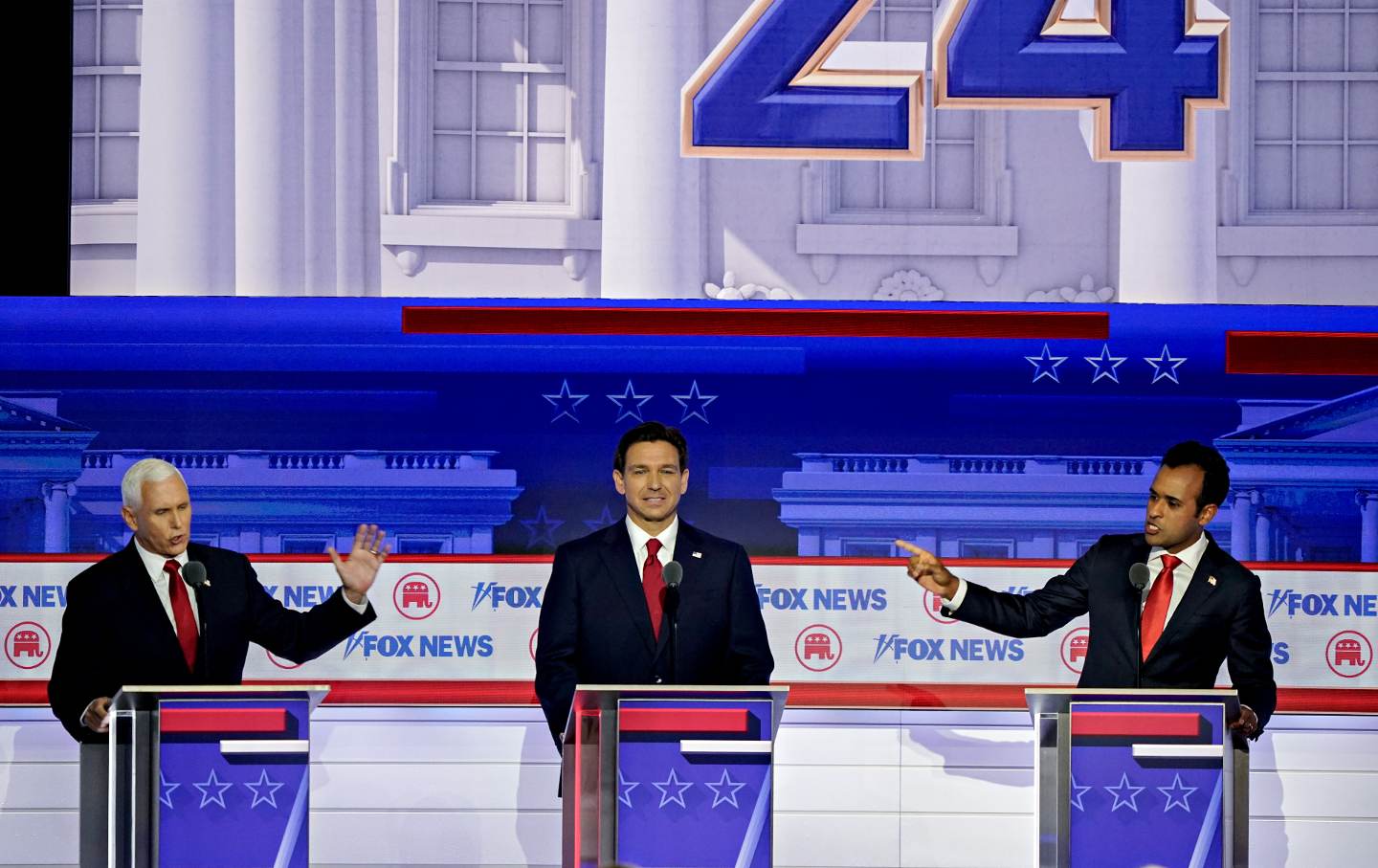
Mike Pence, Ron DeSantis, and Vivek Ramaswamy at the first GOP 2024 presidential debate in Milwaukee on August 23, 2023.
(Al Drago / Bloomberg via Getty Images)The eight Republicans who will not be the party’s presidential nominee in 2024 held their first debate on Wednesday night in Milwaukee, where they asked a crowd of 4,000 partisans to suspend disbelief regarding their own prospects, the reality of what has become of their party, and—on a day when Milwaukee’s heat index soared to 114 degrees—the climate crisis that, for the most part, Republicans continue to deny.
Here are three takeaways from the surreal opening night of a surreal campaign.
Donald Trump won by not showing up. The Fox News forum was, as former White House chief of staff Reince Priebus said, “an undercard debate.” Without Trump, the 91-times-indicted former president who skipped the event on the night before he was due to turn himself in and be processed at Georgia’s Fulton County jail, the debate felt like watching a Thanksgiving afternoon argument at the kid’s table. It took barely 10 minutes for the discussion to degenerate into name-calling between former vice president Mike Pence and millionaire political newcomer Vivek Ramaswamy, while Florida Governor Ron DeSantis refused to answer questions, former Arkansas governor Asa Hutchinson recounted the number of state employees in the Razorback State, and North Dakota Governor Doug Burgum waxed poetic about small towns.
No one respected the agreed-upon rules. Candidates repeatedly accused one another of dishonesty, inexperience, and irresponsibility. Moderators Bret Baier and Martha MacCallum struggled without success to assert control, especially after former New Jersey governor Chris Christie accused Ramaswamy of sounding like both Barack Obama and ChatGPT and a predictable shout fest ensued. Former United Nations ambassador Nikki Haley proposed a search for “consensus” on abortion and Pence declared that “consensus is the opposite of leadership.” Then a wide-eyed Burgum looked into the camera and ruminated about how “what works in New York is never going to work in North Dakota.” Not to be outdone in the profundity department, Ramaswamy announced, “It is not morning in America. We live in a dark moment and we have to confront the fact that we are in an internal sort of cold cultural civil war.”
Chaotic and boring at the same time, the debate was frequently so incoherent, and so scrambled by word salad recitations of right-wing talking points, that a crowd that began by cheering for all the candidates went silent for long periods of time, rousing only in response to clashes between the candidates and predictable references to George Soros, Hunter Biden, “biological boys,” and “the southern border.” No one except Ramaswamy appeared to gain traction. Several of the more prominent candidates failed even to deliver their prepackaged applause lines.
Things only got interesting an hour into the debate when the discussion turned to “the elephant not in the room.” Asked if they would back Trump, the leader in every national and state poll, as the GOP nominee, the candidates (with the exception of Christie and the principled if little-noticed Hutchinson) sheepishly raised their hands.
Prodded by the moderators, most of the candidates mumbled expressions of concern about Trump’s assaults on the Constitution, but none of them even attempted to call out Trump’s Big Lie about his defeat in the 2020 presidential election. Even Christie, a clear-eyed Trump critic on the campaign trail, lost focus. But there was no lack of clarity on Ramaswamy’s part, as he proclaimed, “President Trump was the best president of the 21st century.” At that, the crowd erupted with wild and sustained applause. Trump, who skipped the debate and sat down instead for a softball interview with former Fox host Tucker Carlson that aired Wednesday evening, has the Republican Party exactly where he wants it.
Ron DeSantis lost by showing up. Declining in the polls, laying off staffers, and struggling to get his campaign on track, DeSantis barely claimed the centerstage spot that was reserved for the candidate with the strongest poll numbers—among those who were willing to show up, that is. The Florida governor was sidelined through much of Wednesday night’s debate, as Pence hogged the microphone, Ramaswamy peddled red-meat talking points (“end the teachers unions,” “the nuclear family is the greatest form of governance known to mankind,” “deliver a Reagan 1980 revolution”), and Christie kept slinging insults. He also clearly lost a dust-up with Haley on Ukraine policy, in which he seemed ill-informed and defensive, while she came off as engaged and decisive.
Again and again, DeSantis had to be reminded that he had not answered the questions that were put to him. But this was about more than obfuscation. Used to being treated with kid gloves by right-wing media, DeSantis struggled to keep up with the other candidates as they took rhetorical potshots at one another and then demanded time to respond. “He didn’t have time to distinguish himself,” former Trump aide Kellyanne Conway said on Fox News after the debate wrapped.
But this was about more than timing. When you’re struggling to match the dynamism of Mike Pence, you’re not going anyplace—except back to Tallahassee. The biggest sign of DeSantis’s failure to make a mark might have been that, despite his supposed marquee status, the other candidates almost completely ignored him, mostly choosing to pick fights with Ramaswamy, who appears to be surging. If there was any lingering uncertainty about whether he’s the Scott Walker of 2024—an over-hyped, not-ready-for-primetime blowhard destined for humiliation—the debate in Milwaukee settled the question. Ramaswamy has been catching up to the Floridian in the polls, and nothing about this debate will change that trajectory.
Republicans are more than ready to let the planet burn. The debate took place on the hottest day of the summer in Milwaukee, as temperatures soared past the 100-degree mark and the humidity made it feel like it was exponentially hotter. Milwaukee schools were closed on Wednesday because of the excessive heat, and they were set to close again on Thursday. Sure, it can get hot in Wisconsin in August. But the temperatures Milwaukee was experiencing didn’t feel normal for a lakefront city in the upper Midwest. And the heat wave was definitely on the mind of Milwaukeeans as the GOP debate approached. “It’s almost as hot as hell in Milwaukee today for the GOP debate. Coincidence? I think not,” mused Wisconsin labor activist and congressional candidate Randy Bryce. With devastating wildfires leaving hundreds dead in Hawaii, tropical storms and unprecedented flooding in California, and a massive “heat dome” hovering over middle America and producing record temperatures, the big question going into the debate was whether the candidates for the nomination of the party of climate denial would even mention the crisis. If it was left to the contenders, they almost certainly would have neglected the issue. MacCallum and Baier featured a question from a college-age conservative about whether the contenders could respond to the concerns of young voters regarding climate change. Then the Republicans who would be president revealed themselves—and their party—as the problem rather than the solution.
Things heated up when MacCallum asked, “Do you believe in human behavior causing climate change? Raise your hand if you do.” No one did.
Popular
“swipe left below to view more authors”Swipe →In fact, DeSantis attacked the very idea of taking a clear stand regarding the future of the planet. “Look, we’re not schoolchildren,” the governor whined. “Let’s have the debate.” But instead of focusing on the policy matter at hand, the governor took a wild swing at President Biden’s response to the wildfires on Maui. It landed with a thud. MacCallum and Baier kept trying to get DeSantis to answer the question. He never did.
Ramaswamy displayed no such reticence, however. He leaped into the fray with full-throated climate denial. “Let’s be honest as Republicans,” he roared. “I’m the only person on the stage who isn’t bought and paid for, so I can say this: that climate change is a hoax.”
Ramaswamy claimed that “the reality is more people are dying of bad climate change policies than they are of actual climate change.” Instead of challenging that absurd, and wildly false, statement, the other candidates objected to the suggestion that they were “bought and paid for.”
Even when they were finally forced to address the issue, the supposed “adults in the room” got it wrong. While she grudgingly admitted that climate change might be “real,” Haley refused to focus on what the United States can do about it. Instead, the former UN ambassador avoided any mention of the fossil fuel industry and deflected to a talking point about “telling China and India they have to lower their emissions.”
She earned modest approval from the crowd for that response. But Ramaswamy drew raucous applause from the Republican partisans when he promised to “drill, frack, burn coal, embrace nuclear,” and claimed that “fossil fuels are a requirement for prosperity.”
Wisconsin state Senator Chris Larson, a Milwaukee Democrat, described the real problem with Wednesday’s debate: “On the hottest day of the year in Wisconsin, climate change denying Republicans are debating (and Wisconsin is getting hit with) additional hot air from the GOP’s B squad.”
Indeed, while Trump’s Big Lie about the 2020 election may be the issue of the moment, the debate reminded Americans that the original Big Lie of Republican politics was, is, and by all available evidence will continue to be climate denial.
We cannot back down
We now confront a second Trump presidency.
There’s not a moment to lose. We must harness our fears, our grief, and yes, our anger, to resist the dangerous policies Donald Trump will unleash on our country. We rededicate ourselves to our role as journalists and writers of principle and conscience.
Today, we also steel ourselves for the fight ahead. It will demand a fearless spirit, an informed mind, wise analysis, and humane resistance. We face the enactment of Project 2025, a far-right supreme court, political authoritarianism, increasing inequality and record homelessness, a looming climate crisis, and conflicts abroad. The Nation will expose and propose, nurture investigative reporting, and stand together as a community to keep hope and possibility alive. The Nation’s work will continue—as it has in good and not-so-good times—to develop alternative ideas and visions, to deepen our mission of truth-telling and deep reporting, and to further solidarity in a nation divided.
Armed with a remarkable 160 years of bold, independent journalism, our mandate today remains the same as when abolitionists first founded The Nation—to uphold the principles of democracy and freedom, serve as a beacon through the darkest days of resistance, and to envision and struggle for a brighter future.
The day is dark, the forces arrayed are tenacious, but as the late Nation editorial board member Toni Morrison wrote “No! This is precisely the time when artists go to work. There is no time for despair, no place for self-pity, no need for silence, no room for fear. We speak, we write, we do language. That is how civilizations heal.”
I urge you to stand with The Nation and donate today.
Onwards,
Katrina vanden Heuvel
Editorial Director and Publisher, The Nation
More from The Nation
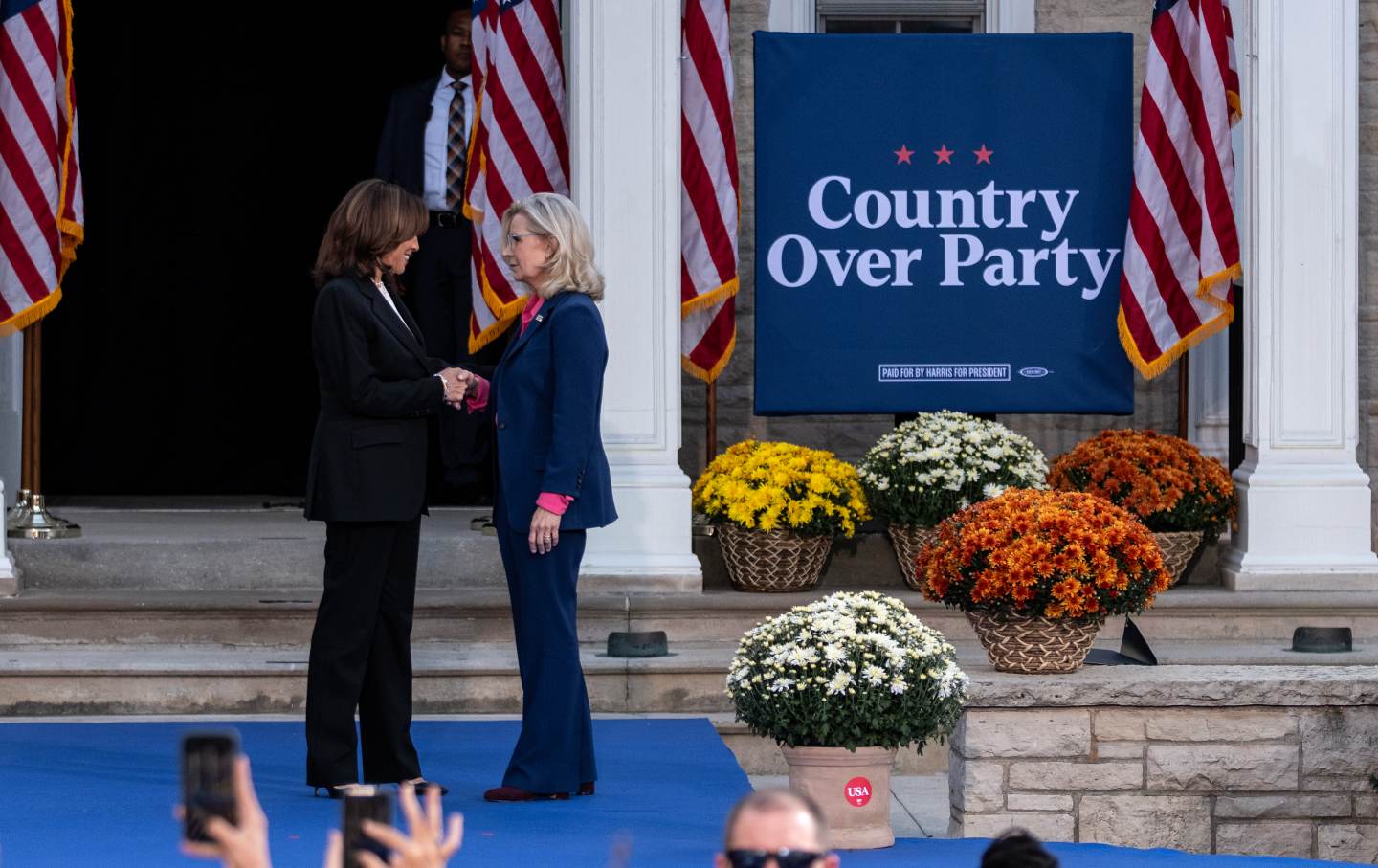
The Democrats Disregarded Poor and Low-Income Voters—to Their Peril The Democrats Disregarded Poor and Low-Income Voters—to Their Peril
Poverty is clearly anything but a marginal experience—and yet, as in the last election, it’s repeatedly minimalized and dismissed in our nation’s politics.

Forgotten Recent History Forgotten Recent History
Igniting resentment, exploding war.
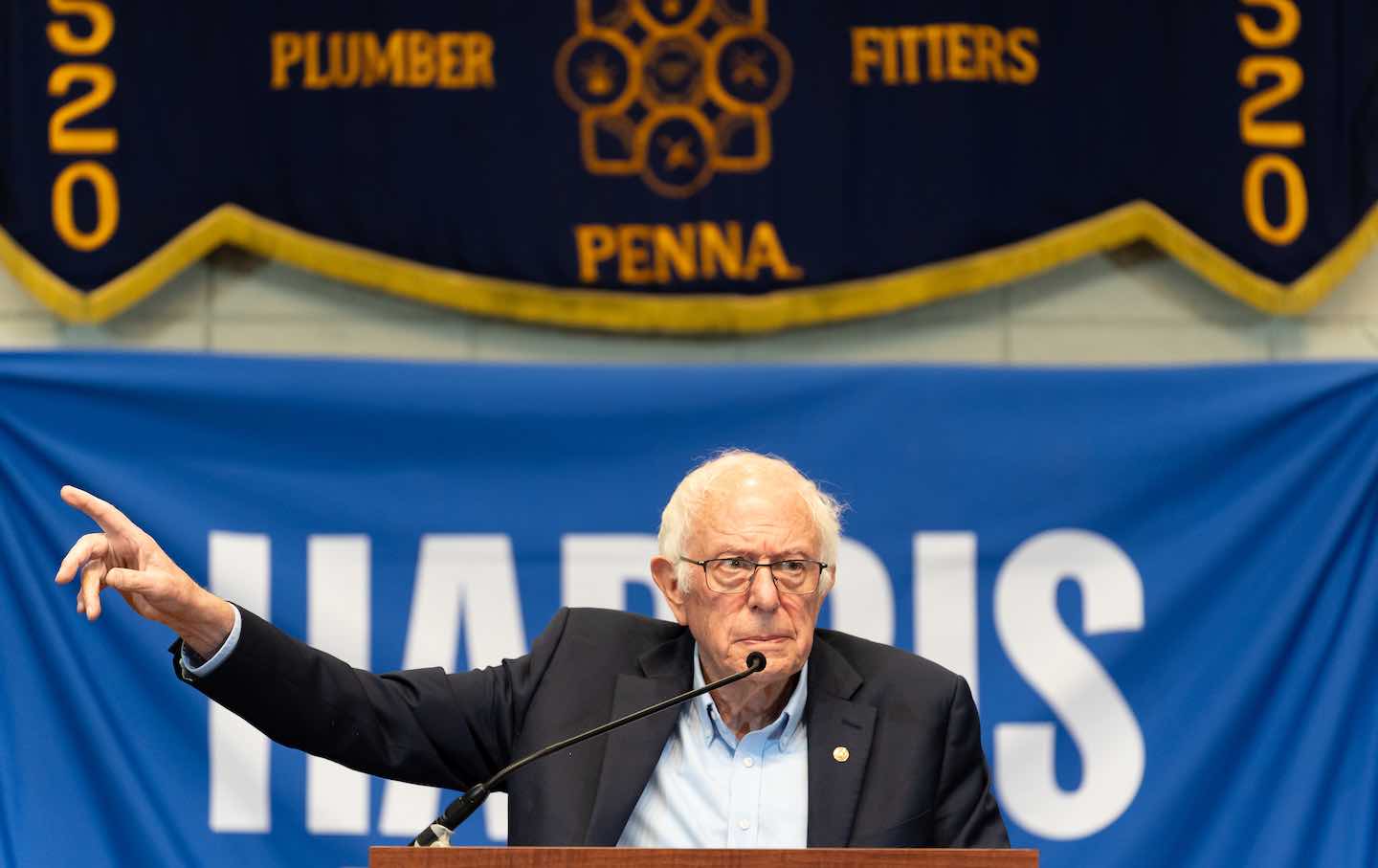
Bernie Sanders: We Need More Working-Class Candidates to Challenge Both Parties Bernie Sanders: We Need More Working-Class Candidates to Challenge Both Parties
The senator says in this exclusive interview that challengers to status quo politics can run in Democratic primaries or as independents.
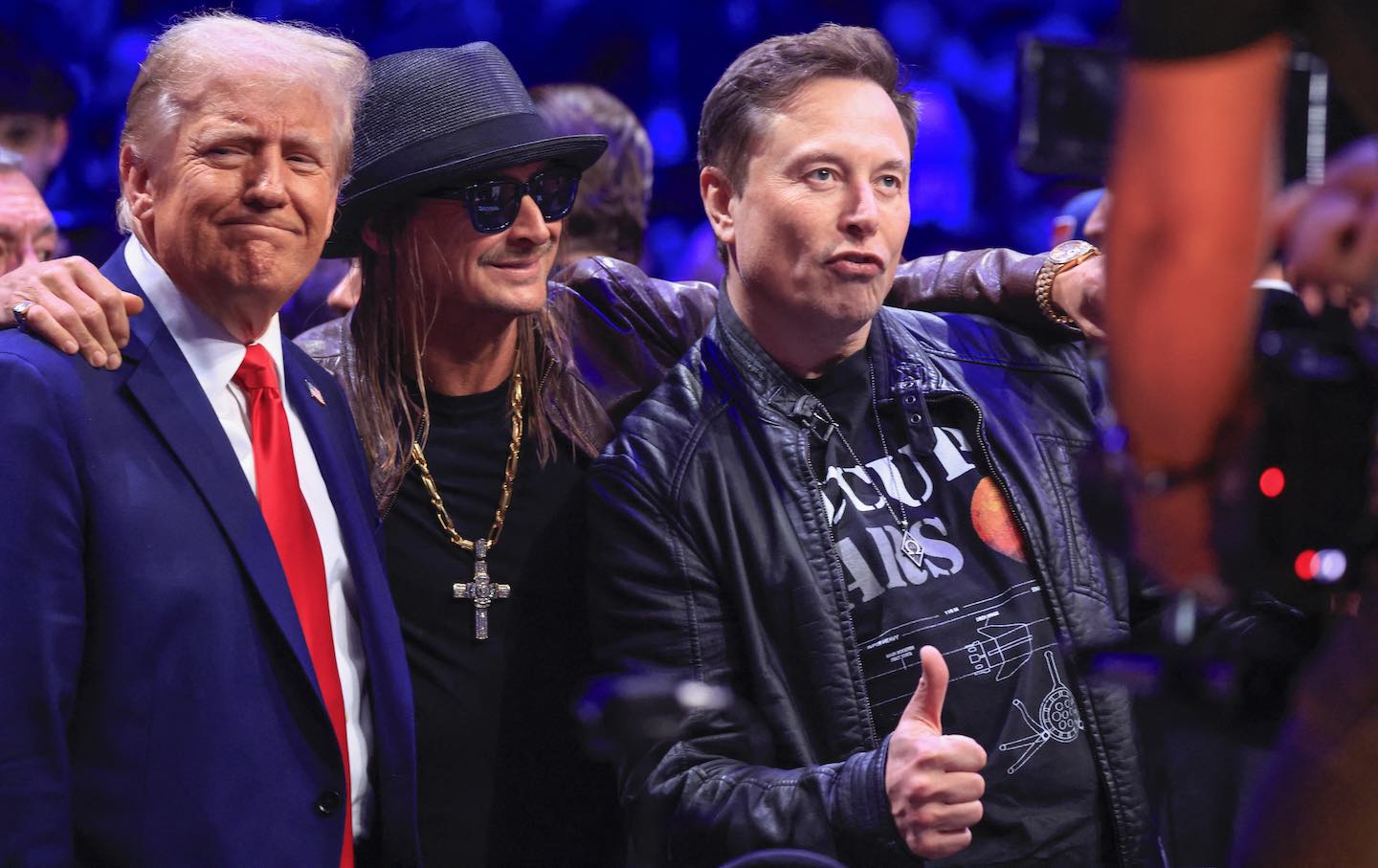
Somehow, Americans Are Liking Trump Better Every Day Somehow, Americans Are Liking Trump Better Every Day
The incoming administration's cabinet appointments are a bizarre disaster. So why are the president-elect's approval ratings going up?

The Rise of the Chinese American Far Right The Rise of the Chinese American Far Right
The election showed what has been clear for some time: Chinese communities are becoming a new center of conservative power.
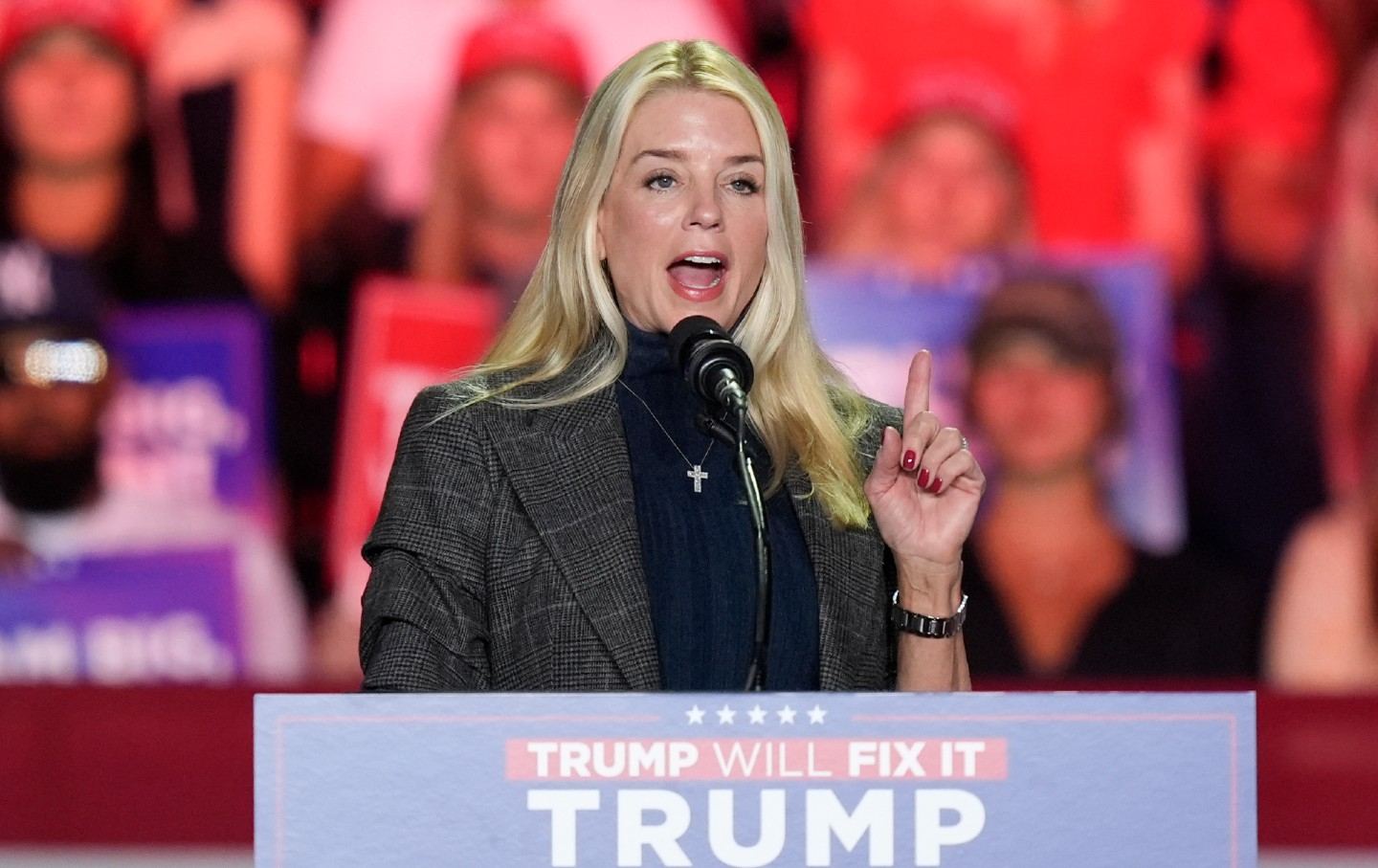
The Silver Lining of the Pam Bondi Nomination The Silver Lining of the Pam Bondi Nomination
While Bondi is a Trump loyalist who will do real damage, she won’t be as dangerous as one of the Federalist Society ideologues who might have gotten the post.


